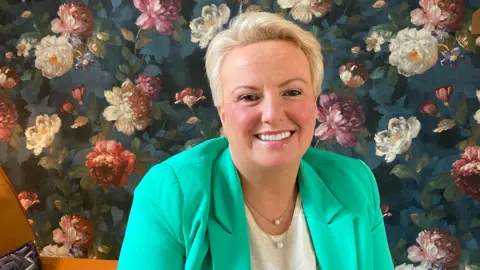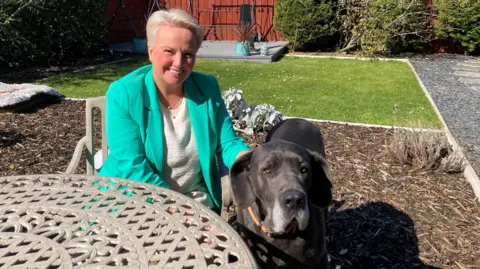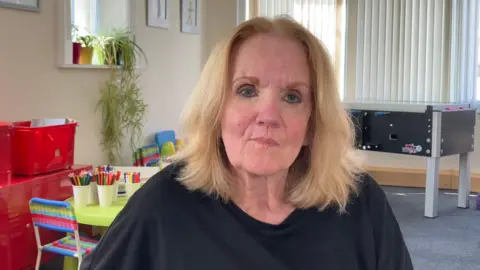Woman's private ADHD diagnosis led to 'life-changing' medication
 BBC
BBCA County Armagh woman who was privately diagnosed with ADHD, said the first time she took medication for it was "life-changing".
Jennifer Cousins said it was "unfair" that there are no commissioned services for Attention Deficit Hyperactivity Disorder (ADHD) in Northern Ireland.
A condition that affects people's behaviour, the 42-year-old said she was always trying new things, never felt settled, and was impulsive.
"I was ticking all of these boxes of things that I had struggled with for so long, and I was finally able to see why these things were having an impact on my life," she said.
The Department of Health (DoH) said "the demand for ADHD assessment far outweighs capacity, which is resulting in long waiting times of several years".
Ms Cousins said "it's no surprise that there are adults out there that have struggled with this condition their whole lives and there is no funding or commissioned service to diagnose".
The exact cause of ADHD is unknown, but it often runs in families.
Ms Cousins said after children in her family were diagnosed with the condition, she realised she had similar traits and found out she had combined ADHD.
"It was emotionally a tough time to be diagnosed because, like anyone, you don't want to be different," she said.
"But at the same time it totally made sense."
'The chaos of my brain'
The mother-of-one said everyday tasks before medication were quite "stressful and overwhelming".
"There's this saying that I think is quite funny and it's quite true about the ADHD brain being like an Internet browser.
"There's 17 tabs open, there's three frozen and you don't know where the music's coming from. So that's a bit like me," she said.
Ms Cousins said getting ready in the morning she is often flitting between tasks.
"All of a sudden, there's maybe four or five tasks going on around me.
"Unfortunately, sometimes I might cut myself or smash a plate or burn the dinner, so obviously the chaos of my brain displays itself through day-to-day tasks."
Ms Cousins said while phone reminders to do things have been "my lifesaver", she has found ADHD burnout difficult.
"It's something that happens whenever you're so mentally and emotionally and physically energetic every single day.
"Having to focus super hard to try and get things done was really quite challenging, quite debilitating actually," she said.

Ms Cousins said medication helped improve her focus and manage her energy levels.
She has a shared care agreement which allows "seamless shared care and decision making" between her, her private specialist consultant, and her GP "in relation to medicines use".
"I was able to manage all the things that I need to do every day like picking up the child from school, cooking a dinner, tidying up round me, looking after the garden, walking the dog.
"It made such a difference that I finally felt more like myself."
Ms Cousins said she loves the fact she has ADHD because she said many people are creative as a result.
She writes songs and poetry, and has recently written a book about her childhood, educating about the signs, symptoms, and behaviours of ADHD.

ADHD was first recognised in adults in 2008, eight years after childhood ADHD was formally recognised through National Institute for Health and Care Excellence (NICE) in most of the UK NHS (England, Wales, and NI).
The DoH said whilst a level of provision is available, it is aware that "this has also led to inconsistencies between trusts".
Sarah Salters, CEO of ADD-NI, said the charity receives a high number of weekly referrals for ADHD support programmes.
Since January they have had 165 referrals, with almost half of those for adults.
She said the lack of services within the health service for adults is "diabolical", leaving adults "very frustrated" with "nowhere to turn".
Ms Salters said many people are "forced" to go private for a diagnosis and also have difficulty getting medication as not all GPs honour the shared care protocol.
"About 4% of our adult population have ADHD, that's about 70,000 people across Northern Ireland and there's possibly a very high number of people who are undiagnosed," she said.
"Where you get the right support, the proper strategies in place, people with ADHD start to see that they can do things that they weren't capable of doing before."
The DoH has commissioned a "needs assessment" with a view to bringing forward recommendations to inform a commissioned ADHD service, which is expected to be completed by the end of June 2025.
It said any decision "will be based on an assessment of the level of demand for services, and in the context of future budget availability".
Ms Salters is not confident services will be commissioned as she does not think ADHD is seen as a "priority".
